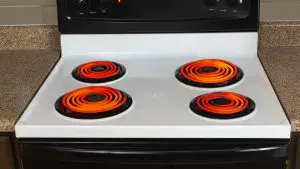Updated on March 12, 2023
Why Is My Electric Stove Making A Buzzing Noise
Conveniently, electric stoves exist. However, they have considerable influence. It’s best to be on the lookout when they start making noises. An regular stove has a minimal risk of exploding or burning your house on fire. You can’t, however, take any risks. Before the worst happens, take care of the sounds.
Electric Stove Started Making Noise – Why?
A variety of factors may cause an electric stove to emit a sound, including:
1). Vibration
Older electric stoves rattle due to their structure, according to GE Appliances. Vibrations are caused by the manner in which the surface element is welded. A humming sound may be heard by certain persons.
2). Thermal Expansion
Thermal expansion is to fault for any popping or crackling you hear. When exposed to heat, metals expand. When they cool down, they shrink. Noise might be heard as a consequence of the tension.
3). Arcing
Electrical equipment often exhibit arcing. It’s a common occurrence. Despite this, most of the time the arcs are quite small. Large arcs and sparks make a lot of noise. Furthermore, they pose a threat to one’s health and safety. They are ominous signs.
4). Faulty Fan Motor
If your stove’s engine is malfunctioning, you’ll hear a loud rattling sound when you turn it on. The oven is well-ventilated thanks to the fan. Manually turning the fan on a range is possible if you have the necessary skills and expertise.
You’ll need a new fan if your current one is stiff. There is a chance that the fan’s blades may break. To discover whether the fan is malfunctioning, you may not wish to access its inner panel. If this is the case, pay close attention to the stove’s efficiency.
The stove’s cavity is kept heated with the help of the fan. If the stove is running, but the appliance’s efficiency has decreased, the fan is most likely to blame.
5). Cooling System
There are cooling systems in most modern ovens. Those cooling systems will continue to operate even if the stove is off, which is why you hear weird sounds.
It’s possible for the thermostat to fail and keep the cooling system running for up to a few minutes.
Why is my stove making a buzzing noise?

When the fan motor in the oven circulates heated air to provide a uniform bake, the buzzing may occur. As a result, the meal may be on fire. If the oven has an exhaust vent, the buzzing might be caused by a foreign object lodged in the vent.
My stove makes a buzzing noise, but why?
The most probable explanation, based on the issue description, is an imbalance in the mixture of air and fuel. The top burners have either too much air or too much fuel. A hum, whistle, or whining sound is the result. Close the burner air shutters on the tubes to change the air-fuel ratio.
Why is my gas stove making a hissing sound? With gas stove cooktops, there is a distinct hissing sound that you don’t hear with electric models. The gas escaping from the vents is the root of the problem. Your cooktop may not be receiving gas or the burner vents may be blocked if you hear hissing but your burner will not light.
Then then, are ovens intended to generate a lot of noise?
Unobtrusive Sounds When using a gas oven, it’s not uncommon to hear the gas flow into the appliance as it cooks. As the spark ignites the flame, you could hear a clicking sound. To keep the oven cavity at the proper temperature, the oven burner may make a hissing or whooshing sound as it cycles on and off.
Is there a sound with an electric stove?
Even after the cooktop has been switched off, the cooling fan may continue to operate until the internal temperatures have been brought down. As a matter of course, these sounds will be heard. The time it takes an electric cooktop to cool down depends on a variety of things.

